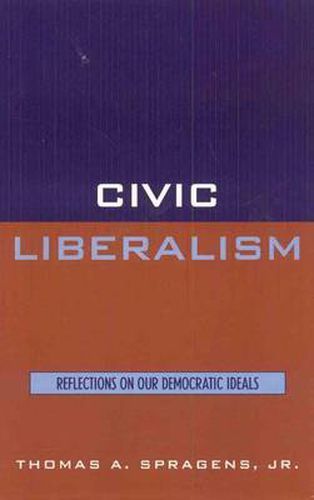Readings Newsletter
Become a Readings Member to make your shopping experience even easier.
Sign in or sign up for free!
You’re not far away from qualifying for FREE standard shipping within Australia
You’ve qualified for FREE standard shipping within Australia
The cart is loading…






This work asserts that today’s most prominent versions of democratic ideals - libertarianism, liberal egalitarianism, difference liberalism, and the liberalism of fear - lead our polity significantly astray. Thomas A. Spragens offers another alternative. He argues that we should recover the multiple and complex aspirations found within the tradition of democratic liberalism and integrate them into a more compelling public philosophy for our time - or what he calls civic liberalism. Civic liberalism, Spragens contends, endorses both liberty and equality although neither can properly be understood as a maximising principle. Instead, liberty should be seen as the constitutive threshold good of autonomy; and equality should be seen as a moral postulate and instrumental good. Moreover, civic liberalism explicitly embraces forms of fraternity , civic friendship, and civic virtue consistent with respect for social pluralism. Therefore, a better understanding of our democratic ideals will free us from the constrictive orthodoxies of the left and right, lead us toward better public policy, and help us become a well-ordered society of flourishing, self-governing civic equals.
$9.00 standard shipping within Australia
FREE standard shipping within Australia for orders over $100.00
Express & International shipping calculated at checkout
This work asserts that today’s most prominent versions of democratic ideals - libertarianism, liberal egalitarianism, difference liberalism, and the liberalism of fear - lead our polity significantly astray. Thomas A. Spragens offers another alternative. He argues that we should recover the multiple and complex aspirations found within the tradition of democratic liberalism and integrate them into a more compelling public philosophy for our time - or what he calls civic liberalism. Civic liberalism, Spragens contends, endorses both liberty and equality although neither can properly be understood as a maximising principle. Instead, liberty should be seen as the constitutive threshold good of autonomy; and equality should be seen as a moral postulate and instrumental good. Moreover, civic liberalism explicitly embraces forms of fraternity , civic friendship, and civic virtue consistent with respect for social pluralism. Therefore, a better understanding of our democratic ideals will free us from the constrictive orthodoxies of the left and right, lead us toward better public policy, and help us become a well-ordered society of flourishing, self-governing civic equals.